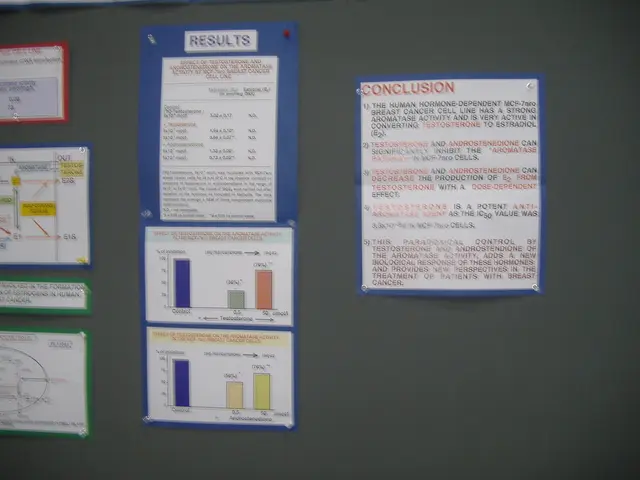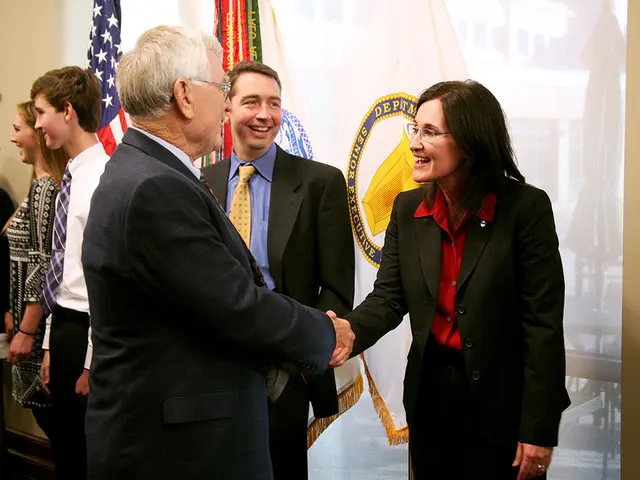Antitrust relationships between the United States and Europe are on the decline, with concerns and disagreements over a range of industries, from tech giants to agricultural trade.
Let's Dish on the Crooked Alliance Between US and European Antitrust Bosses
Once upon a time, the US and European antitrust enforcers had a cozy relationship, even exchanging cuddly elephant toys as a symbol of their camaraderie. But since Donald Trump's team took over, all that's left is bitter bickering and barbed jabs.
Recently, Andrew Ferguson, chair of the US Federal Trade Commission (FTC), took the stage at an international conference, usually a platform for collaboration, to ding "Brussels bureaucrats" for supposedly smothering enterprise and crippling American businesses.
"Europe, my friends, is lagging behind," Ferguson declared at the International Competition Network conference in Edinburgh, citing Europe's "heavy regulatory hand" as the culprit.
This shift in tone signifies a significant turning point in the transatlantic partnership, which had only grown closer in the digital era. The bromance between Jonathan Kanter of the Department of Justice and Lina Khan of the FTC under Joe Biden's presidency was the partnership's peak.
Now, the question on everyone's mind is whether this rude awakening will lead to tangible consequences or merely rattle the checks on the corporate power of tech titans stretching across multiple jurisdictions.
While close cross-border cooperation once spooked dealmakers, a breakdown in relations and the ensuing policy uncertainty might be just as unsettling, argue lawyers on both sides of the pond.
"If you think US/EU friction provides certainty, you're just kidding yourself," said a senior US mergers and acquisitions lawyer, warning that a fragmented system could spell more problems than cooperation.
As the UK Competition and Markets Authority focuses more on UK interests, questions about the future of collaborative trust-busting efforts linger.
"We've moved from a period of global coordination to a time where it seems like we'll have to adopt a more nationalist outlook," said antitrust lawyer Liza Lovdahl Gormsen. This shift, she cautioned, could lead to protectionist outcomes that harm consumers and the global economy.
Ferguson certainly didn't mince words in his Edinburgh speech, but it wasn't the first time he'd slammed Europe. The heated exchange that followed, though, was telling.
In response to Ferguson's critique, Andreas Mundt, president of Germany's Bundeskartellamt competition authority, encouraged a more optimistic outlook and emphasized the importance of showing mutual respect. Despite Ferguson's harsh words, Mundt maintained that there's more common ground than divergence in practice.
Yet, EU competition chief Teresa Ribera seemed less convinced. Responding to Ferguson's criticism of the EU's digital regulation, she questioned his understanding of the Digital Markets Act and stressed the importance of mutual respect.
However, European officials are trying to stay positive, pointing to the antitrust officials' newfound embrace of tough enforcement against Big Tech under the Biden administration.
The legal battles against Google, Meta, Apple, and Amazon continue on both sides of the Atlantic. In April, the European Commission slapped Apple and Meta with fines totalling €700 million for breaching antitrust rules. According to Ribera, US authorities are making similar decisions on similar cases.
Despite the negative tone, EU officials insist that they and their US counterparts share a common aim: reining in the power of tech giants. But the stubborn disagreements might just boil down to rulemaking, with Washington pushing for deregulation and Brussels pushing for implementing strict rules to boost competition.
Ultimately, lawyers on both sides of the pond are keeping a close eye on the transatlantic antitrust policy as they develop. While some see potential forks leading to trouble, others believe consensus will remain intact.
One flashpoint may be sustainability, as Ribera aims to encourage mergers that would help provide sustainable goods and equipment, a stark contrast to the Trump administration's position. As regulatory bodies reevaluate their approaches to antitrust and the limits of merger control, transatlantic cooperation remains uncertain.
Following the shake-up at the UK Competition and Markets Authority, cardell flew to the US to mend fences with Ferguson and Slater. The meetings reportedly went well, with Cardell making a positive impression on Ferguson compared to some of his European counterparts.
Still, tensions may stem from new CMA powers. The regulator can now designate companies with an outsized position in certain digital markets as having strategic market status and impose certain conduct requirements. The CMA is investigating Google and Apple with the potential handing of strategic market status in mind.
Only time will tell how these transatlantic tensions will unfold, but the rhetoric seems to already be having an impact. A senior European official at the Edinburgh conference expressed surprise at Ferguson's negative tone and would never do the same,Implying a new era of distrust and competition between US and European antitrust authorities.
- The shift in tone between US and European antitrust enforcers, as demonstrated by Andrew Ferguson's remarks, has raised questions about the future impact on businesses and markets, particularly in regards to mergers and acquisitions.
- With the UK Competition and Markets Authority focusing more on UK interests and the US Federal Trade Commission pushing for deregulation, concerns about the future of collaborative trust-busting efforts and transatlantic competition policy are growing.
- The legal battles against tech giants continue on both sides of the Atlantic, with the European Commission imposing fines on Apple and Meta for breaching antitrust rules, similar decisions being made by US authorities, and a potential focus on sustainability as a flashpoint between the regulatory bodies.
- As the US and European antitrust authorities navigate their newfound disagreements on rulemaking, Investors and businesses are closely watching policy-and-legislation developments, aiming to understand the General-news shaping the global economy and technology sector.








